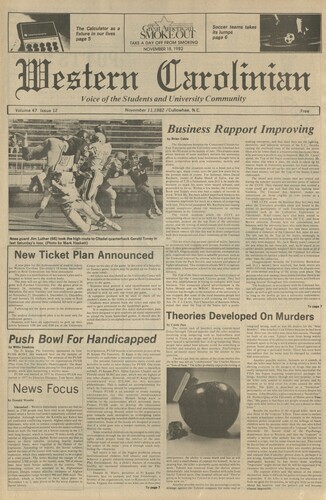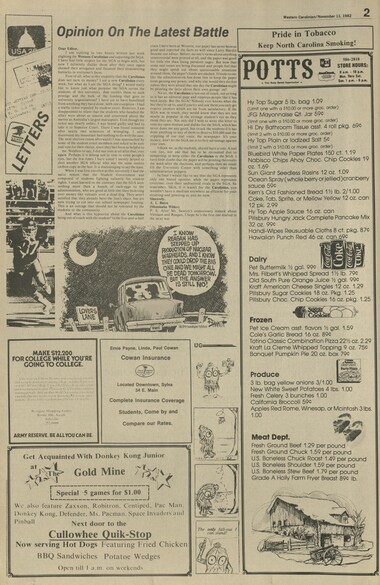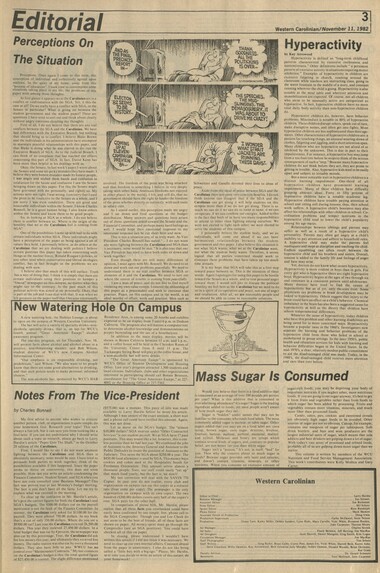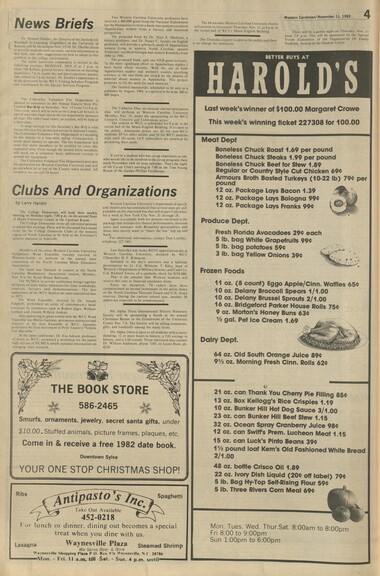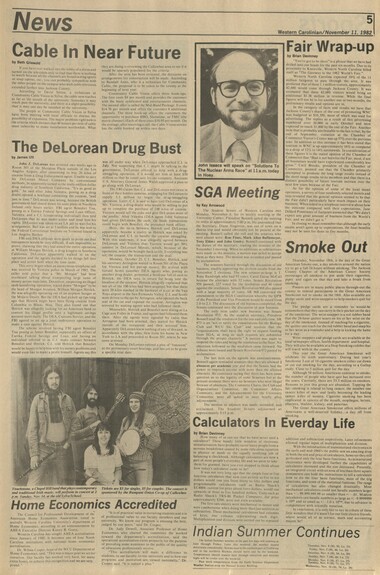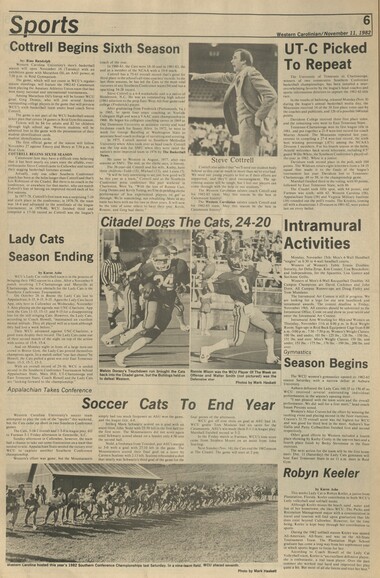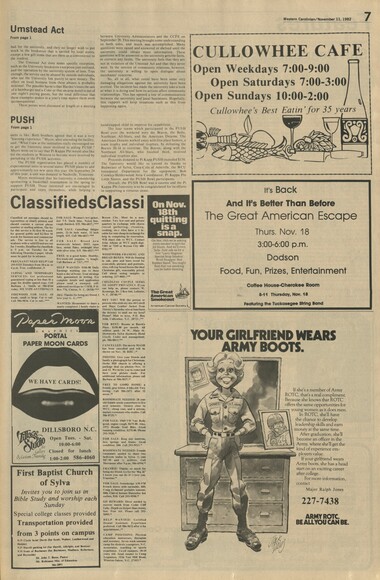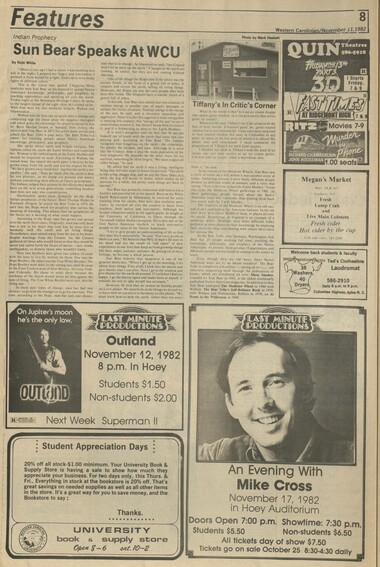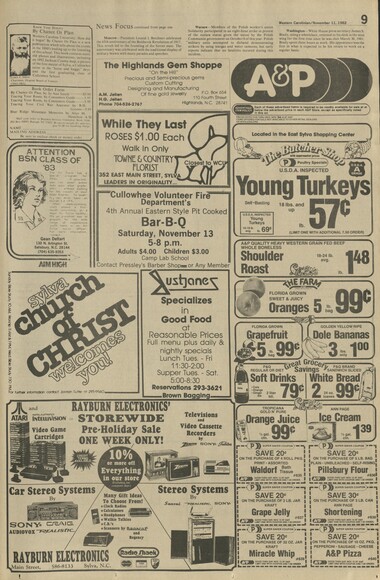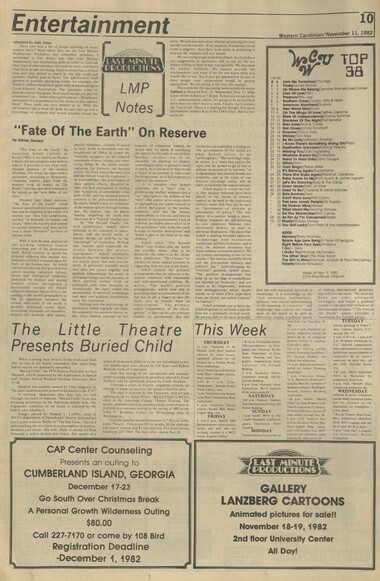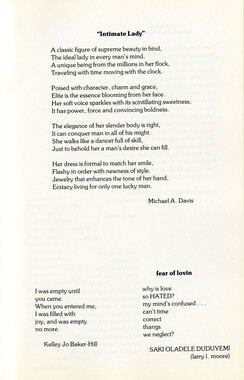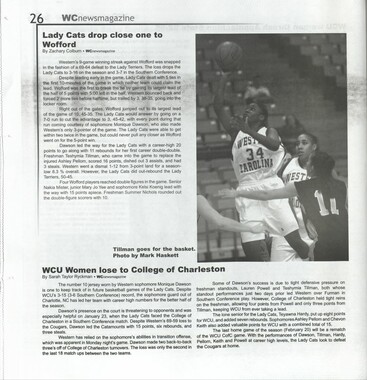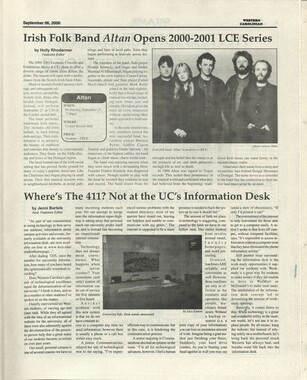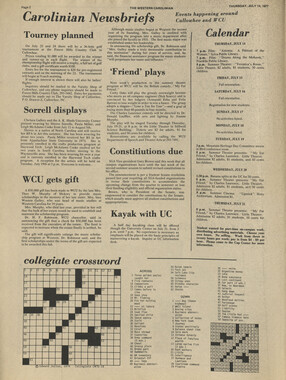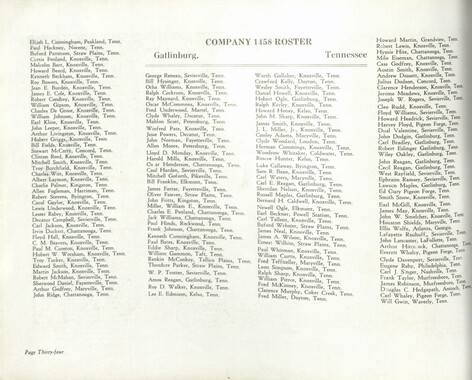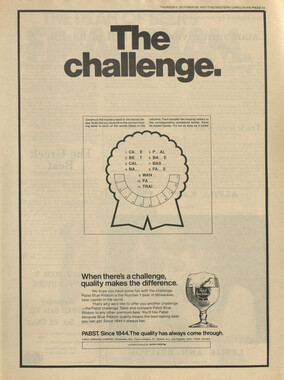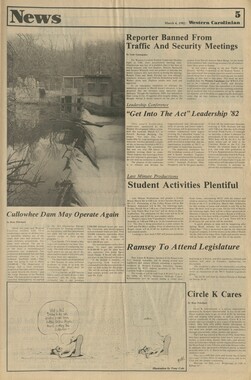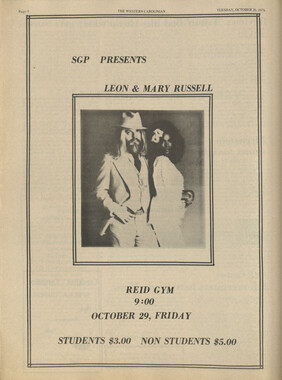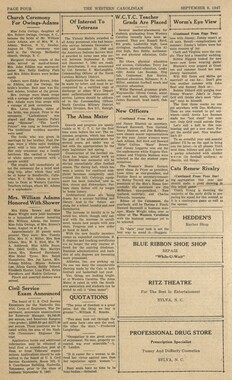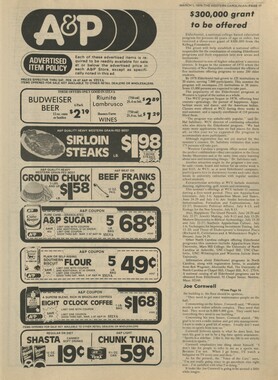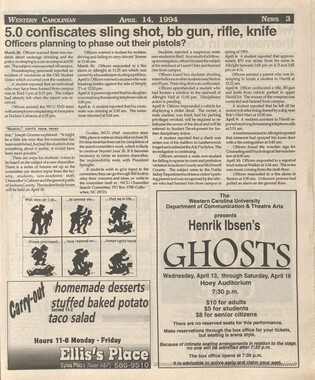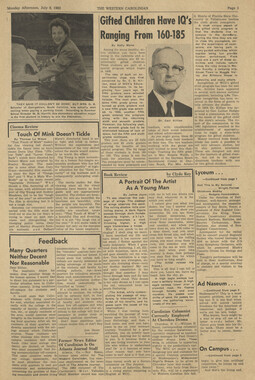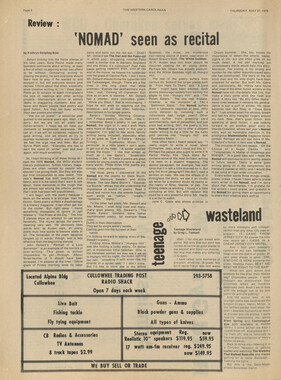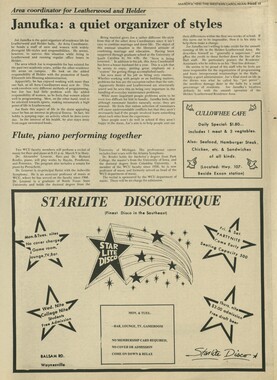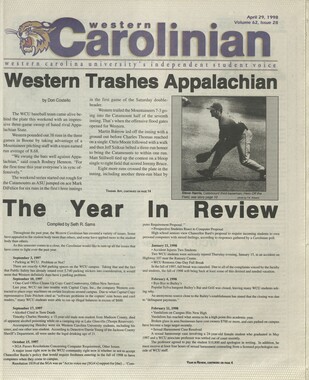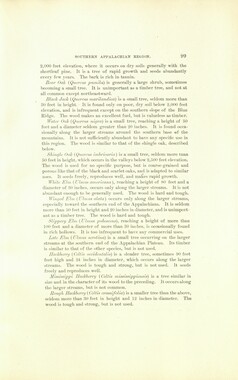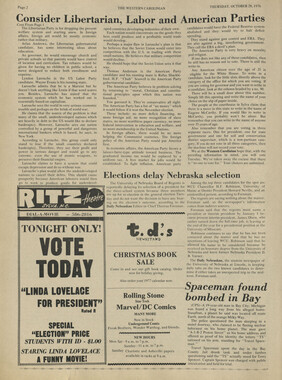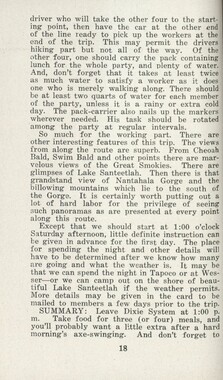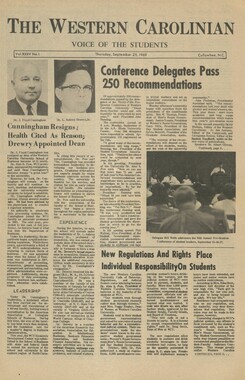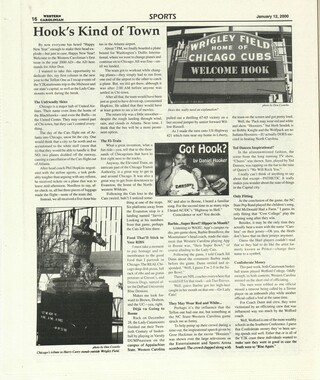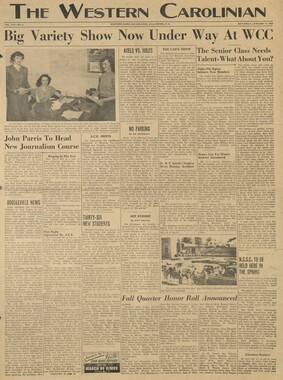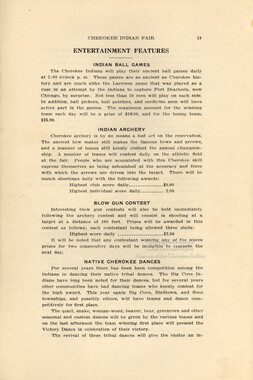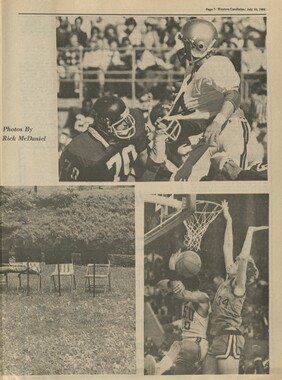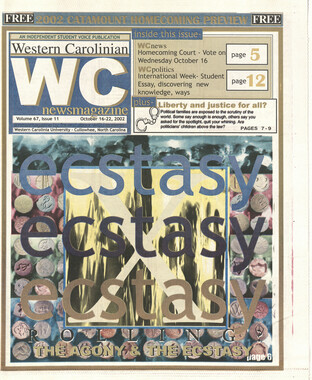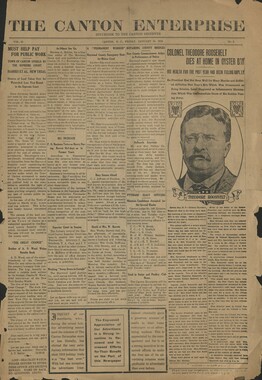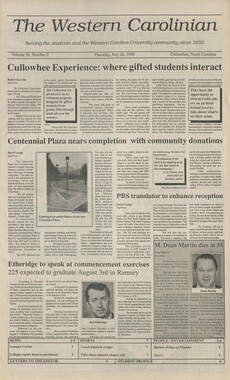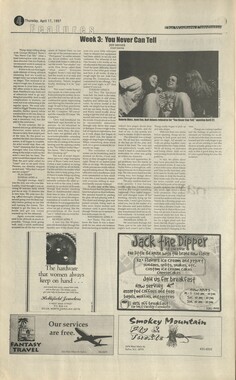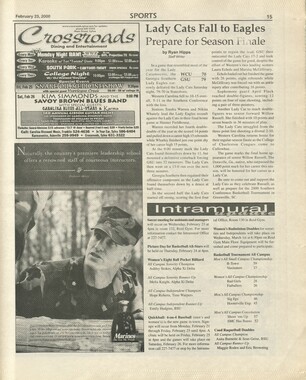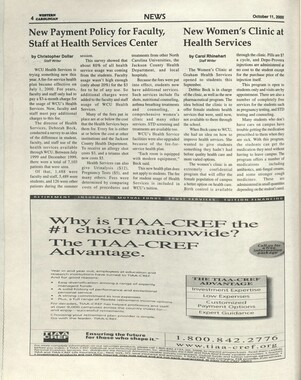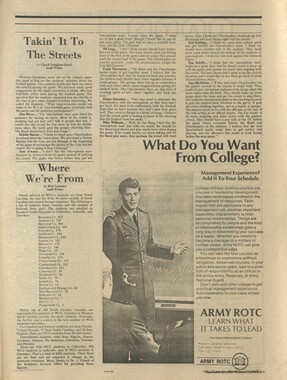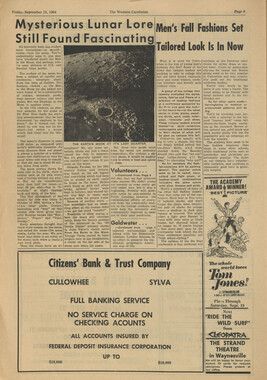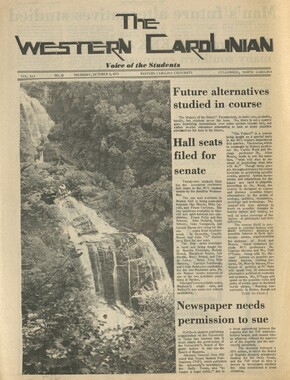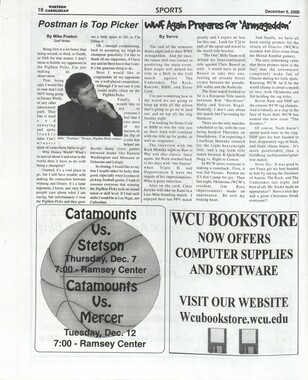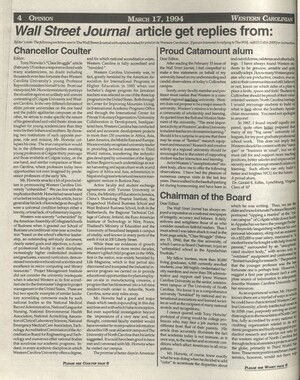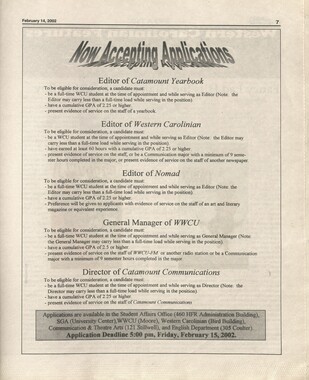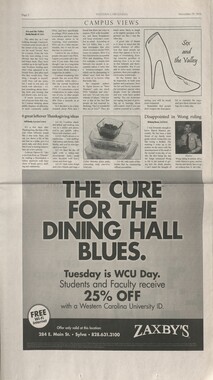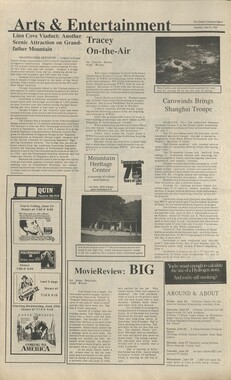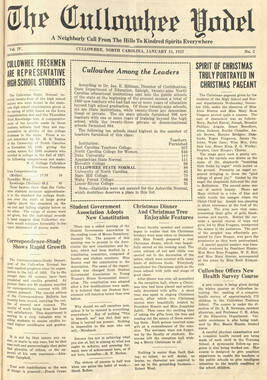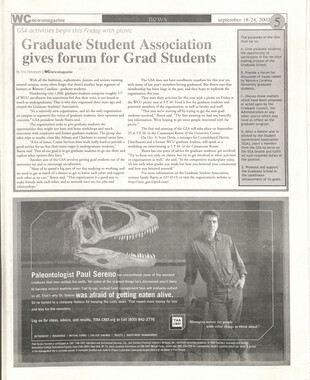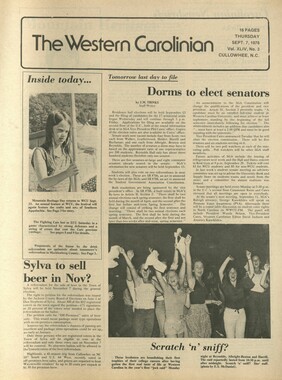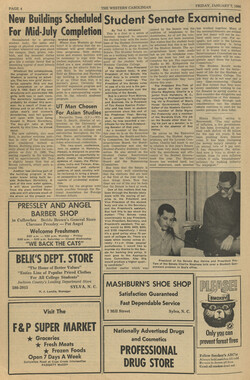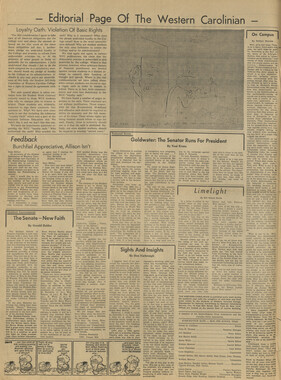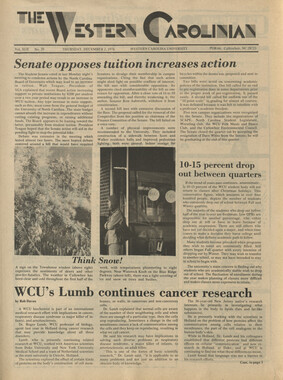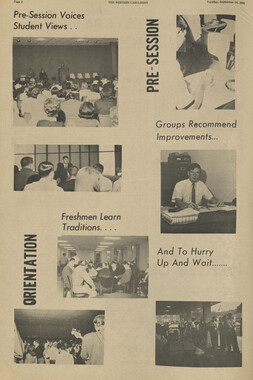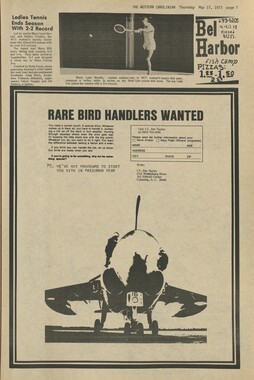Western Carolina University (20)
View all
- Canton Champion Fibre Company (2308)
- Cherokee Traditions (291)
- Civil War in Southern Appalachia (165)
- Craft Revival (1942)
- Great Smoky Mountains - A Park for America (2946)
- Highlights from Western Carolina University (430)
- Horace Kephart (941)
- Journeys Through Jackson (159)
- LGBTQIA+ Archive of Jackson County (85)
- Oral Histories of Western North Carolina (314)
- Picturing Appalachia (6873)
- Stories of Mountain Folk (413)
- Travel Western North Carolina (160)
- Western Carolina University Fine Art Museum Vitreograph Collection (129)
- Western Carolina University Herbarium (92)
- Western Carolina University: Making Memories (738)
- Western Carolina University Publications (2488)
- Western Carolina University Restricted Electronic Theses and Dissertations (146)
- Western North Carolina Regional Maps (71)
- World War II in Southern Appalachia (131)
University of North Carolina Asheville (6)
View all
- Allanstand Cottage Industries (62)
- Appalachian National Park Association (53)
- Bennett, Kelly, 1890-1974 (1463)
- Berry, Walter (76)
- Brasstown Carvers (40)
- Carver, George Washington, 1864?-1943 (26)
- Cathey, Joseph, 1803-1874 (1)
- Champion Fibre Company (233)
- Champion Paper and Fibre Company (297)
- Cherokee Indian Fair Association (16)
- Cherokee Language Program (22)
- Crowe, Amanda (40)
- Edmonston, Thomas Benton, 1842-1907 (7)
- Ensley, A. L. (Abraham Lincoln), 1865-1948 (275)
- Fromer, Irving Rhodes, 1913-1994 (70)
- George Butz (BFS 1907) (46)
- Goodrich, Frances Louisa (120)
- Grant, George Alexander, 1891-1964 (96)
- Heard, Marian Gladys (60)
- Kephart, Calvin, 1883-1969 (15)
- Kephart, Horace, 1862-1931 (313)
- Kephart, Laura, 1862-1954 (39)
- Laney, Gideon Thomas, 1889-1976 (439)
- Masa, George, 1881-1933 (61)
- McElhinney, William Julian, 1896-1953 (44)
- Niggli, Josephina, 1910-1983 (10)
- North Carolina Park Commission (105)
- Osborne, Kezia Stradley (9)
- Owens, Samuel Robert, 1918-1995 (11)
- Penland Weavers and Potters (36)
- Roberts, Vivienne (15)
- Roth, Albert, 1890-1974 (142)
- Schenck, Carl Alwin, 1868-1955 (1)
- Sherrill's Photography Studio (2565)
- Southern Highland Handicraft Guild (127)
- Southern Highlanders, Inc. (71)
- Stalcup, Jesse Bryson (46)
- Stearns, I. K. (213)
- Thompson, James Edward, 1880-1976 (226)
- United States. Indian Arts and Crafts Board (130)
- USFS (683)
- Vance, Zebulon Baird, 1830-1894 (1)
- Weaver, Zebulon, 1872-1948 (58)
- Western Carolina College (230)
- Western Carolina Teachers College (282)
- Western Carolina University (2005)
- Western Carolina University. Mountain Heritage Center (18)
- Whitman, Walt, 1819-1892 (10)
- Wilburn, Hiram Coleman, 1880-1967 (73)
- Williams, Isadora (3)
- Cain, Doreyl Ammons (0)
- Crittenden, Lorraine (0)
- Rhodes, Judy (0)
- Smith, Edward Clark (0)
- Appalachian Region, Southern (2569)
- Asheville (N.C.) (1923)
- Avery County (N.C.) (26)
- Blount County (Tenn.) (195)
- Buncombe County (N.C.) (1672)
- Cherokee County (N.C.) (283)
- Clay County (N.C.) (555)
- Graham County (N.C.) (236)
- Great Smoky Mountains National Park (N.C. and Tenn.) (519)
- Haywood County (N.C.) (3569)
- Henderson County (N.C.) (70)
- Jackson County (N.C.) (4909)
- Knox County (Tenn.) (35)
- Knoxville (Tenn.) (13)
- Lake Santeetlah (N.C.) (10)
- Macon County (N.C.) (420)
- Madison County (N.C.) (215)
- McDowell County (N.C.) (39)
- Mitchell County (N.C.) (132)
- Polk County (N.C.) (35)
- Qualla Boundary (982)
- Rutherford County (N.C.) (76)
- Swain County (N.C.) (2182)
- Transylvania County (N.C.) (270)
- Watauga County (N.C.) (12)
- Waynesville (N.C.) (86)
- Yancey County (N.C.) (72)
- Aerial Photographs (3)
- Aerial Views (60)
- Albums (books) (4)
- Articles (1)
- Artifacts (object Genre) (228)
- Bibliographies (1)
- Biography (general Genre) (2)
- Cards (information Artifacts) (38)
- Clippings (information Artifacts) (191)
- Copybooks (instructional Materials) (3)
- Crafts (art Genres) (622)
- Depictions (visual Works) (21)
- Design Drawings (1)
- Drawings (visual Works) (185)
- Envelopes (73)
- Exhibitions (events) (1)
- Facsimiles (reproductions) (1)
- Fiction (general Genre) (4)
- Financial Records (12)
- Fliers (printed Matter) (67)
- Glass Plate Negatives (381)
- Guidebooks (2)
- Internegatives (10)
- Interviews (815)
- Land Surveys (102)
- Letters (correspondence) (1013)
- Manuscripts (documents) (618)
- Maps (documents) (177)
- Memorandums (25)
- Minutes (administrative Records) (59)
- Negatives (photographs) (6090)
- Newsletters (1290)
- Newspapers (2)
- Notebooks (8)
- Occupation Currency (1)
- Paintings (visual Works) (1)
- Pen And Ink Drawings (1)
- Periodicals (193)
- Personal Narratives (10)
- Photographs (12976)
- Plans (maps) (1)
- Poetry (5)
- Portraits (4568)
- Postcards (329)
- Programs (documents) (181)
- Publications (documents) (2440)
- Questionnaires (65)
- Relief Prints (26)
- Sayings (literary Genre) (1)
- Scrapbooks (282)
- Sheet Music (2)
- Slides (photographs) (402)
- Songs (musical Compositions) (2)
- Sound Recordings (796)
- Specimens (92)
- Speeches (documents) (18)
- Tintypes (photographs) (8)
- Transcripts (322)
- Video Recordings (physical Artifacts) (23)
- Text Messages (0)
- A.L. Ensley Collection (275)
- Appalachian Industrial School Records (7)
- Appalachian National Park Association Records (336)
- Axley-Meroney Collection (2)
- Bayard Wootten Photograph Collection (20)
- Bethel Rural Community Organization Collection (7)
- Blumer Collection (5)
- C.W. Slagle Collection (20)
- Canton Area Historical Museum (2110)
- Carlos C. Campbell Collection (462)
- Cataloochee History Project (64)
- Cherokee Studies Collection (4)
- Daisy Dame Photograph Album (5)
- Daniel Boone VI Collection (1)
- Doris Ulmann Photograph Collection (112)
- Elizabeth H. Lasley Collection (1)
- Elizabeth Woolworth Szold Fleharty Collection (4)
- Frank Fry Collection (95)
- George Masa Collection (173)
- Gideon Laney Collection (452)
- Hazel Scarborough Collection (2)
- Hiram C. Wilburn Papers (28)
- Historic Photographs Collection (236)
- Horace Kephart Collection (861)
- Humbard Collection (33)
- Hunter and Weaver Families Collection (1)
- I. D. Blumenthal Collection (4)
- Isadora Williams Collection (4)
- Jesse Bryson Stalcup Collection (47)
- Jim Thompson Collection (224)
- John B. Battle Collection (7)
- John C. Campbell Folk School Records (80)
- John Parris Collection (6)
- Judaculla Rock project (2)
- Kelly Bennett Collection (1482)
- Love Family Papers (11)
- Major Wiley Parris Civil War Letters (3)
- Map Collection (12)
- McFee-Misemer Civil War Letters (34)
- Mountain Heritage Center Collection (4)
- Norburn - Robertson - Thomson Families Collection (44)
- Pauline Hood Collection (7)
- Pre-Guild Collection (2)
- Qualla Arts and Crafts Mutual Collection (12)
- R.A. Romanes Collection (681)
- Rosser H. Taylor Collection (1)
- Samuel Robert Owens Collection (94)
- Sara Madison Collection (144)
- Sherrill Studio Photo Collection (2558)
- Smoky Mountains Hiking Club Collection (616)
- Stories of Mountain Folk - Radio Programs (374)
- The Reporter, Western Carolina University (510)
- Venoy and Elizabeth Reed Collection (16)
- WCU Gender and Sexuality Oral History Project (32)
- WCU Mountain Heritage Center Oral Histories (25)
- WCU Oral History Collection - Mountain People, Mountain Lives (71)
- WCU Students Newspapers Collection (1920)
- Western North Carolina Tomorrow Black Oral History Project (69)
- William Williams Stringfield Collection (2)
- Zebulon Weaver Collection (109)
- African Americans (390)
- Appalachian Trail (35)
- Artisans (521)
- Cherokee art (84)
- Cherokee artists -- North Carolina (10)
- Cherokee language (21)
- Cherokee pottery (101)
- Cherokee women (208)
- Church buildings (189)
- Civilian Conservation Corps (U.S.) (111)
- College student newspapers and periodicals (2009)
- Dams (107)
- Dance (1023)
- Education (222)
- Floods (61)
- Folk music (1015)
- Forced removal, 1813-1903 (2)
- Forest conservation (220)
- Forests and forestry (1184)
- Gender nonconformity (4)
- Great Smoky Mountains National Park (N.C. and Tenn.) (181)
- Hunting (45)
- Landscape photography (25)
- Logging (119)
- Maps (83)
- Mines and mineral resources (8)
- North Carolina -- Maps (18)
- Paper industry (38)
- Postcards (255)
- Pottery (135)
- Railroad trains (72)
- Rural electrification -- North Carolina, Western (3)
- School integration -- Southern States (2)
- Segregation -- North Carolina, Western (5)
- Slavery (5)
- Sports (452)
- Storytelling (243)
- Waterfalls -- Great Smoky Mountains (N.C. and Tenn.) (66)
- Weaving -- Appalachian Region, Southern (280)
- Wood-carving -- Appalachian Region, Southern (328)
- World War, 1939-1945 (173)
Western Carolinia Volume 47 Number 12
Item
Item’s are ‘child’ level descriptions to ‘parent’ objects, (e.g. one page of a whole book).
-
-
The Calculator as a fixture in our lives page 5 it he Great American SMOKEOUT TAKE A DAY OFF FROM SMOKING NOVEMBER 18,1982 Soccer teams takes its lumps page 6 esimt OJaroltman Voice of the Students and University Community Volume 47 Issue 12 November 11,1982 /Cullowhee, N.C. Free j Nose guard Jim Luther (66) took the high route to Citadel quarterback Gerald Toney in last Saturday's loss. (Photo by Mark Haskett) New Ticket Plan Announced A new plan for the disbursement of student tickets for Western Carolina University's 14 home basketball games in Reid Gymnasium has been announced. The plan is a modification of last season's plan and is designed to better serve the student body. The plan will not go into effect until the January 24 game with Furman University. For the games prior to January 24, including the exhibition game with Marathon Oil next Tuesday and non-conference games on November 27, December 6, December 11, December 17 and January 19, students need only to come to Reid Gymnasium and present their validated ID card to gain admittance. Following are the main points in the disbursement plan: — The student disbursement plan is to be used only for conference games. —Students will have an opportunity to pick up their tickets between 1:00 pm and 4:00 pm at the University Center on the day of the game. In the event of a Saturday or Sunday game, tickets may be picked upon Friday at the same times. All tickets not distributed at the University Center will be available at the student ticket gate at Reid Gymnasium prior to the game. —Students must present a valid identification card to pick up a basketball game ticket. Each student will be allowed to pick up only one ticket per game. -A computer printout will be used to check off the student's name as the ticket is dispensed. —Students must present both the ticket and valid ID card to gain admission to the basketball game. It is emphasized that this ticket disbursement plan has been designed to give students an equal opportunity to attend the home basketball games. It should also be noted that there is no alphabetical system to this season's plan. Push Bowl For Handicapped by Willia Dawkins The Pi Kappa Phi fraternity sponsored its first PUSH BOWL this weekend here on the campus of Western Carolina University. The purpose of the PUSH BOWI. was to raise money for the organization PUSH (Play Units For The Severely Handicapped). The Bowl involved four football teams playing for first place, and a trophy, while also supporting a worthy cause. PUSH was started in 1977 by Director-PUSH was started in 1977 by Director-Designer. Tom Sayre. After News Focus by Donald Woodie Islamabad Western diplomatic sources say that as many as 2700 people may have died in an Afghanistan tunnel when a Soviet fuel tanker apparently collided and exploded. Although neither the Kremlin nor Kabul has yet confirmed conflicting reports, Afghan rebels and the diplomats, who wish to remain completely unidentified, say that a conflagration occured when the tanker collided head-on with the lead car on a Soviet convoy in the 1.7 mile long tunnel, which is located 70 miles north of the capital of Afghanistan, Kabul. Rebel sources say that as many as thirty vehicles, including heavily loaded transport buses, were engulfed in the flames of the explosion. According to reports, the Soviet soldiers sealed the ends of the tunnel with tanks upon hearing the explosion, which they apparently assumed to be a signal of a rebel attack. The tanks blocked the escape of the estimated 2,700 people in the tunnel, some 700 of whom may have been Soviet soldiers in the convoy. The remaining victims are assumed to be Afghanistan citizens. Details remain sketchy; estimates of Afghan civilian casualties range between 400 and 2000 dead. The accident, which is believed to have taken place on November I or 2, may prove to be the worst disaster in recent history. its origination, PUSH became a nationwide project of the Pi Kappa Phi fraternity. Pi Kapp is the only national fraternity to undertake a national service project. The national fraternity sponsors many events and activities in order to raise money for PUSH. One event which has been very successful in the past is marathon softball. Pi Kappa Phi's Alpha Epsilon Chapter out of Florida raised $8,062 last year, which was the highest of any other chapter. However, overall Pi Kapp Chapters accumulated over $55,000 for this national philanthropic. This is indeed an accomplishment for which the fraternity should be congratulated. Project PUSH is an attempt to create learning environments for the severely handicapped institutionalized children. Human beings learn in relation to the environment which surrounds them. Project PUSH seeks to develop the educational opportunities of the otherwise bland and unstimulating institutional setting. Monies raised for the organization goes towards such necessities as re-designing entire rooms and helping the retarded children seek educational opportunities. Some of the rooms are designed so sturdy that if a child goes into a temper tantrum, he cannot destroy the rooms. Some retarded children are encouraged to enter play environments through the use of stimulating sounds and lights which project from the interior of the unit. Different types of sound test a deaf child s ability to seek the source of the noise - even if through touch only, feeling the vibrations. Self injury is one of the biggest problems among institutionalized children. Self abusive and injurious behavior is greatly reduced during interaction with the Play Environment. So, a child's chances of remaining healthy are increased tremendously with the Play Environments. Donald H. Myers, president of Pi Kappa Phi fraternity here on campus, and Stan Froncberger, a brother of the organization, went to Roanoke College in Salem. Virginia this summer to see what one of these play To page 7 Business Rapport Improving by Brian Cable The discussions between the Concerned Citizens for Free Enterprise and the University over the Umstead Act (GS: 66-58) arose in the middle of July. This dispute came about because of some auxiliary services the university offers to students which local businesses thought were in direct competition with area restaurants, motels, and stores. Although this situation came to a head just a few months ago, many events over the past few years led to the present state of events. For instance, when David Rayburn, owner of Radio Shack of Sylva, was the proprietor of T.D.'s Newsstand, now D.J.'s, he made the decision to stock his store with record albums, and proceeded to do so. Within a few weeks, the University Book and Supply store also had a supply of records in stock. When Mr. Rayburn added paperback books to his inventory, so did the bookstore. Rayburn claims that the bookstore duplicates his stock as a means of competing with him. This belief prompted Mr. Rayburn into issuing several complaints about the bookstore to various departments in the University. The recent incidents which the CCFE are complaining about have to do with the Top of the Stairs restaurant, Jocated on the top floor of the university center, and the renting of motel rooms and dorm rooms (during the summer) by the university. Local restaurants and motel owners felt that this was in direct competition with their businesses and direct violations of the Umstead Act. This act states that no state operated utility, business or institution will compete with private business in any way. It then goes on to list the exceptions and limitations of the act. Organizations and institutions exempted are jails, organizations that have a saleable product, such as the firewood removed by citizens who have purchased a permit from the Park Service, and schools and places of higher education. This exception allows WCU to operate restaurants, a bookstore, a hotel or inn, and other outside services. The Top of the Stairs restaurant has been a source of attention for the Concerned Citizens group. They feel that this establishment is trying to compete with local business. This restaurant placed advertisement in the Sylva Herald and on WRGC. However, when this violation was brought to the attention of the university, it was stopped. But some of the local business people feel that the Top of the Stairs is still violating the Umstead Act. Dr. C.J. Carter, Vice Chancellor of Business Affairs, stated that since the Top of the Stairs isn't a profit- making enterprise, and that since they use the lighting, electricity, and janitorial services of the U.C, thereby cutting the overhead costs of the restaurant, the prices there are far lower than in a business that has to pay these bills and turn a profit to stay in business. But, Dr. Carter stated, the Top of the Stairs sometimes loses money. He also states that when it does, the slack is taken up by reserve funds in University accounts for food services. These accounts are set up for any part of food services that loses money, not just the Top of the Stairs, Carter elaborated. The motel and dorm rooms that are rented out during the summer months are another point of interest to the CCFE. They claimed that anyone that wanted a room could get one and that this was hurting local business. The Umstead Act, however, makes no restrictions on those eligible to rent rooms at a University-operated inn. THE CCFE resent the business they feel they lose when the University provides room and board in the dorms to participants of such University-sponsored functions such as the Cullowhee Experience or Elderhostel. Hotel rooms have also been rented to workmen removing asbestos from the U.C. and from Brown cafeteria. Persons here for conventions and business with the university have also used these rooms. Although local businesses feel that these services constitute a violation of the Umstead Act, most do not. The ads run by the Top of the Stairs, seemingly in violation, were obviously in keeping with the spirit of the act; they were stopped. Mr. Jack Haney wasn't aware of the law when he ran those ads, and, as he stated in an earlier article, probably wouldn't have run them at all if he had known. As stated before, the Umstead Act allows the university to operate a snack bar and/or a restaurant other than the cafeterias. Disagreements between the University Bookstore and D.J.'s haven't been resolved, but both stores are under different management than when the dispute over the coincidental stocking of the stores took place. The persons who now manage these stores feel that there is no problem whatsoever between the two stores, and both are staying neutral throughout this controversy. The bookstore, in accordance with the Umstead Act, can sell paper, pens and pencils, books, and educational needs, as well as gift items (including records and t-shirts) so long as the profits go into a university endowment. But, university officials feel the resentment this causes is To page 7 Theories Developed On Murders by Curtis Pate The recent rash of murders using cyanide-laced Extra-Strength Tylenol capsules and the other incidents involving drug tampering such as hydrochloric acid found in Visine eye drops and in Lavoris mouthwash, have caused a nationwide fear of drug tampering. Many people have asked how anyone could do something as horrible and senseless as these murders. Psychologists have advanced many theories on the answer to this question. Theories are that the nature of the crime implies that the killer was not an "exhibitionist" like Charles Manson or "Son of Sam."The killer probably enjoys the feeling of omnipotence, the ability to cause death and fear at will with only a small chance of capture for himself. As far as causing fear, the killer is probably quite satisfied with his work. Tylenol was removed from the shelves almost immediately and hospitals were flooded with calls from fearful Tylenol users. One hospital official said "They're going to be looking for Tylenol in every heart attack case from now on." Another possible motive for the poisonings could be revenge against the Tylenol company for some real or imagined wrong, such as was the motive for the "Mad Bomber", who attacked Con Edison because he had been fired. Here too, the killer may have had success. Through no fault of its own, Tylenol went from being widely popular because of its ability to ease pain without causing stomach upset to being a word almost synonomous with poison. Some people may never buy Tylenol again out of fear of getting a poisoned bottle. There has even been specualtion that the name may be changed to combat bad associations. Another possible motive, fantastic as it sounds, is that the killer may believe he is doing society a favor by alerting everyone to the dangers of drugs that can be easily tampered with. This has also been successful, the FDA has begun requiring tamperproof packages for drugs. Another theory, though not very popular, is that the killer only wanted to murder one person, and by accident or to help cover his crime caused the other deaths. The killer is described as a "borderline" personality, or one who can function in society despite his insanity. John Hinckley is also considered a "borderline". Dr. Herbert Quay of the University of Maine said in Time that. "My guess is that there are people around the killer right now who believe he is odd, but not a threat to their lives." Besides the murders of the original killer, there are also those of the "copycat" killers. These seem to surface in many sensational crimes; for example in the Atlanta murders police suspected some of the killings of black children were by persons other than the one who killed the first youths. The motivation of a "copycat" is hard to determine. Dr. Steven Gold of the Psychology department here at Western said that the "copycat" is usually a person who already has the inclination to commit a crime, but for some reason has not. This could be due to fear of punishment or a feeling that it is wrong. However, when the potential killer sees another person commit a crime, he sees that it can be done with impunity, and reasons that if another person does it, perhaps it is not wrong. Another possibility is that a person who feels inadequate because he has never done anything "important" might decide that he will be important if he emulates the murderer who became so famous. The copycat killers and the nature of the crimes themselves make it difficult for police to locate the person responsible. If the killer is not looking for attention or feels no guilt for his actions, he will give little or no clues about his location and the police's job will become almost impossible
Object
Object’s are ‘parent’ level descriptions to ‘children’ items, (e.g. a book with pages).
-
The Western Carolinian is Western Carolina University's student-run newspaper. The paper was published as the Cullowhee Yodel from 1924 to 1931 before changing its name to The Western Carolinian in 1933.
-

